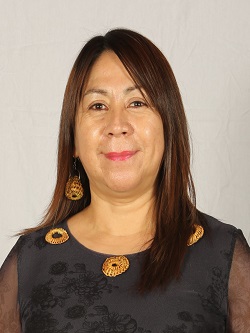Margarita Vargas López facts for kids
Quick facts for kids
Margarita Vargas López
|
|
|---|---|

Margarita Vargas López
|
|
| Member of the Constitutional Convention of Chile | |
| In office July 4, 2021 – July 4, 2022 |
|
| Preceded by | office established |
| Succeeded by | office abolished |
| Constituency | Kawésqar at-large |
| Personal details | |
| Born |
Margarita Virginia Vargas López
October 30, 1969 Villa Puerto Edén, Chile |
| Occupation | Politician |
Margarita Virginia Vargas López, born on October 30, 1969, is a politician from Chile. She is a member of the Kawésqar Indigenous people. In 2021, she was chosen to represent the Kawésqar people in Chile's Constitutional Convention. This was a special group that wrote a new constitution for the country. Besides her political work, Margarita is also a social activist. She works to help her community. She has also written articles for a newspaper called El Mostrador.
Growing Up and Her Family
Margarita was born in a quiet, faraway place called Villa Puerto Edén. This town is also known as Jetarkte by the Kawésqar people. It is their traditional home. When she was young, Margarita and her family moved around a lot. They lived a nomadic life, sailing their boats around Wellington Island and nearby areas. From an early age, Margarita felt a strong connection to her Kawésqar heritage. She was proud of her background, even when others made fun of her for it.
At age 10, Margarita moved to Punta Arenas, a city in the south, to go to school. She has said that the military government in Chile hurt the Kawésqar people. It forced many of them to leave their traditional lands. Margarita explained that this forced change made Indigenous Chileans try to fit into a world that did not understand them.
Margarita's grandmother, Margarita Molinari Edén, was also a Kawésqar activist. She worked to protect Kawésqar culture through legal means. After her grandmother passed away in 1999, Margarita worried that the Kawésqar traditions might disappear. She felt her grandmother was the last person who truly kept their customs alive.
Protecting Kawésqar Culture
Margarita continued her grandmother's efforts to protect Kawésqar cultural works. These works were collected in 1971. She wanted the government to legally protect them. However, in 2018, a court in Punta Arenas said no to her request. This legal case was mentioned in a paper from the University of Chile. It showed how hard it was to get legal protection for Indigenous culture in Chile.
Margarita worked closely with the Office of Indigenous Affairs in the Magallanes Region. She helped create legal protections for Kawésqar communities. These communities are in Villa Puerto Edén, Punta Arenas, and Puerto Natales. She also worked to help the Yaghan people, another Indigenous group from Navarino Island.
Her Political Role
In the 2021 Chilean Constitutional Convention election, Margarita ran to represent the Kawésqar people. The Kawésqar people had a special seat reserved for them in the convention. She was elected and started her work on July 4, 2021.
Margarita has spoken out against Chile's fishing policies. She believes these policies do not consider the traditional ways Indigenous groups fish. She also supports gender parity in government. This means having an equal number of men and women in leadership roles. She noted that Kawésqar culture has always valued equal roles for men and women. Margarita has also called for unity among Indigenous peoples. She suggested that the Kawésqar, Yaghan, and Selkʼnam nations work together. Their shared goal is to achieve self-determination, which means having control over their own future.
See also
 In Spanish: Margarita Vargas López para niños
In Spanish: Margarita Vargas López para niños
 | Calvin Brent |
 | Walter T. Bailey |
 | Martha Cassell Thompson |
 | Alberta Jeannette Cassell |

